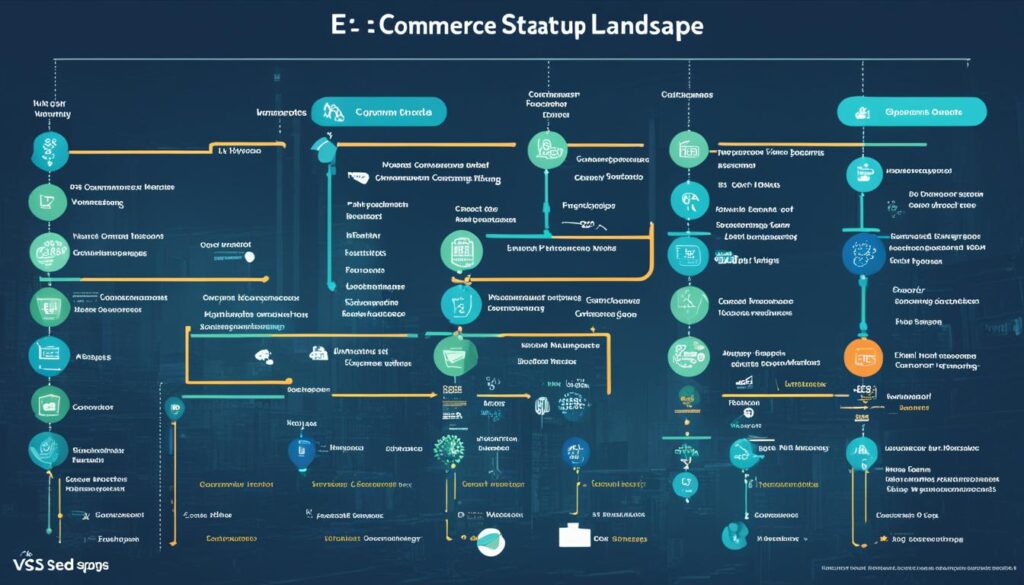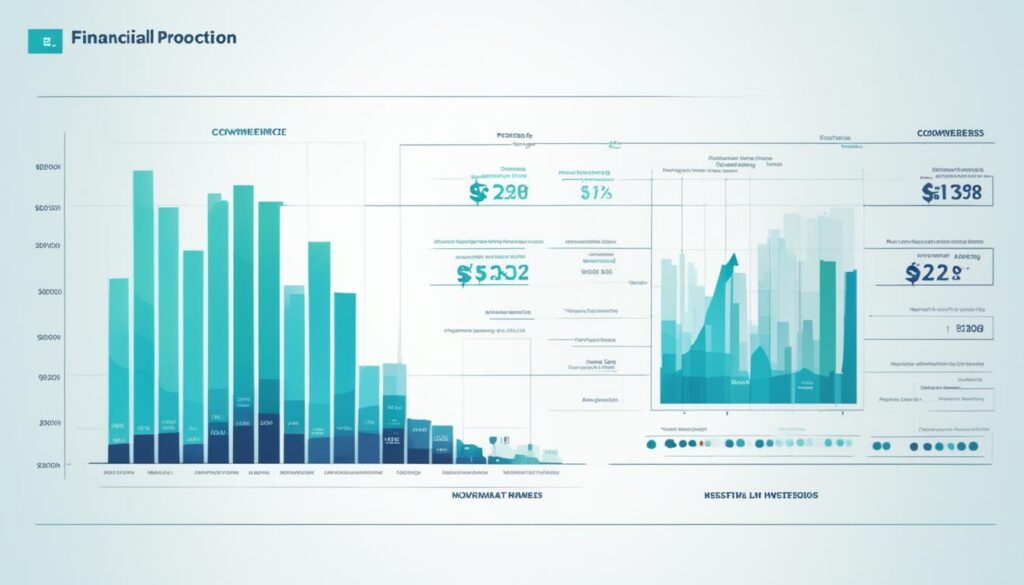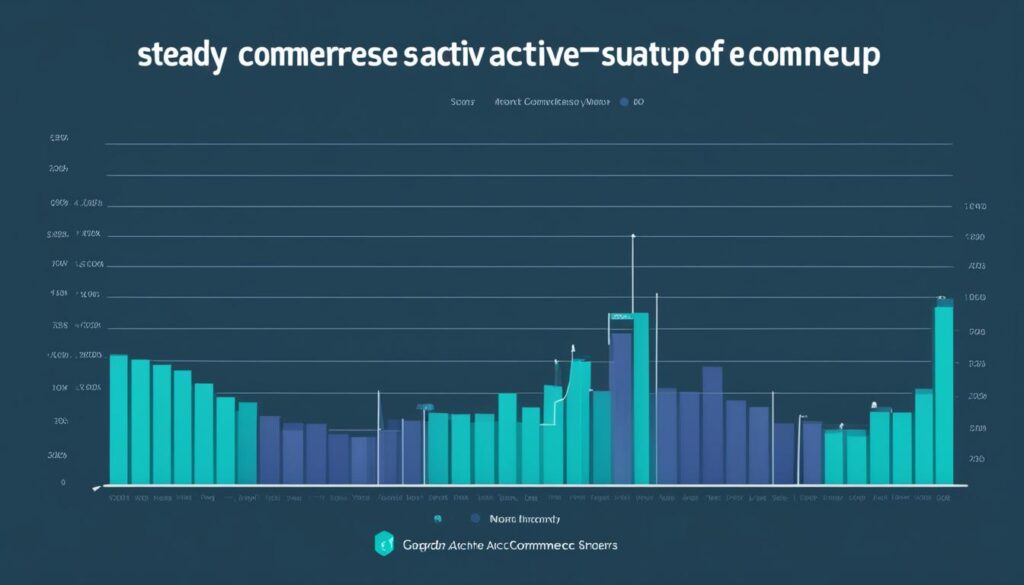In today’s fast-changing e-commerce world, venture capital (VC) has a big role. It’s key in helping new startups grow. Because e-commerce is changing the way we shop, VCs are eager to find new online companies that can grow big and make good returns. But what do VCs want to see in e-commerce startups? What makes an investment opportunity really stand out?
For entrepreneurs aiming to get VC funding, knowing how this process works is crucial. Exploring how VCs think can show us what e-commerce startups need to do to catch their eye. This understanding can help startups prepare well and impress these important investors.
Key Takeaways
- VCs look for e-commerce startups with big potential for growth and profits.
- A strong business plan is vital, clearly showing the market’s potential and what sets the startup apart.
- VCs consider things like the startup’s business model, how much it can grow, and its competition.
- The skills and experience of the founders and their ability to lead and make things happen are key.
- Showing good progress and metrics is crucial to prove the startup is viable.
Understanding the Venture Capital Landscape

Venture capital (VC) is an ever-changing world. Professional investors are key here. They support new companies, especially in e-commerce. Venture capitalists find these promising companies. They give them money, advice, and help them succeed.
The Role of Venture Capitalists
VCs are experts at seeing the value and growth in new companies. This is true, especially in e-commerce. With their deep industry knowledge and networks, they assess if a company is worth investing in. They do more than give money. They give advice, make important connections, and help companies overcome challenges.
Key Factors in Investment Decisions
VCs look at many things before investing in an e-commerce startup. They look at the business model, market size, and how it compares to others. They check if the startup team can execute their plans. They also focus on the startup’s financial needs and how well it’s already doing. Through this, VCs pick the e-commerce companies with the best chance to grow big.
The Importance of a Solid Business Plan

Startups looking for capital need a strong e-commerce business plan. This plan must show the market opportunity clearly. It should also explain what makes the business special and how it plans to succeed.
Addressing Market Opportunity
Venture capitalists want to see a big market opportunity. So, the business plan should cover the market thoroughly. This means looking at its size, how it’s growing, and who the competition is.
Show how the startup can take a big piece of this market. This shows its potential for growth and making money.
Defining a Unique Value Proposition
In a busy market, startups need to stand out. A clear unique value proposition is key. The plan should explain what makes the startup special and needed by customers.
It should highlight how the startup’s products or services solve customer problems. It should also explain why people should choose them over others. This shows the business is worthwhile and can last.
How do VCs evaluate e-commerce startups

Venture capitalists (VCs) look at many factors when judging e-commerce startups. They check the business model, how well it might grow, and its place in the market. This helps them see if it’s a good investment.
Assessing the E-Commerce Business Model
VCs carefully look at an e-commerce startup’s model. They want to see how it makes money, spends money, and if it’s profitable. How the company sets its prices, wins and keeps customers, and grows its operations is important. A solid business model can make VCs interested in investing.
Analyzing Growth Potential
Growth is key to VCs when they check out e-commerce startups. They figure out the market’s size, how fast it’s growing, and if the startup can grab a piece of it. They also see if the startup could move into new areas or offer new products. The strategies for getting users and keeping them are crucial. And they look at the startup’s KPIs to understand if it can keep growing strong.
Evaluating the Competitive Landscape
The company’s edge over the competition is very important to VCs. They want to know what makes it unique. They look at its chances to stay a leader in the market. Trends, new tech, and what might change the game in the future are also on their radar.
| Evaluation Criteria | Description |
|---|---|
| E-Commerce Business Model | Assess revenue streams, cost structure, and overall profitability |
| Growth Potential | Evaluate market size, market share, and scalability |
| Competitive Landscape | Analyze unique value proposition and sustainable competitive advantage |
By digging into these areas, VCs get a good picture of an e-commerce startup. They look at its potential, growth ability, and chances in a competitive market.
Founders and Team: The Driving Force

Venture capitalists focus a lot on an e-commerce startup’s founders and team. They play a huge role in turning the business vision into reality. The founders and the team they gather are key to a startup’s success.
Domain Expertise and Industry Experience
When looking at an e-commerce startup, VCs care about what the team knows. They look for a deep knowledge of the e-commerce world and its challenges. If the founders have a history of success in e-commerce, it’s a big plus for VCs.
Leadership and Execution Capabilities
VCs also check the leadership and how well the startup can execute its plans. They want to see leadership that can make smart choices and run the business well. A strong, capable team is what VCs believe can make a startup succeed.
Financial Projections and Funding Requirements

Venture capitalists pay a lot of attention to the financial plans and what money a startup needs. They look for a clear picture of the company’s future earnings and how much it will make. They also check out what money is needed and how fast it’s being spent (capital needs and burn rate).
Revenue and Profitability Forecasts
VCs look closely at what an e-commerce startup expects to earn and its profits. They want to know how these estimates were figured out. This includes looking at the market trends, how the company plans to get customers, and how well it’s expected to run.
Having strong financial predictions can show that your startup can grow and make money. These things are important for venture capitalists when they’re deciding whether to invest.
Burn Rate and Runway
Besides the money a startup plans to make, venture capitalists also focus on its burn rate and runway. Burn rate is how quickly the startup is spending its money. Runway is how long it can last before needing more funds.
VCs hope to see smart ways of spending money. They want to be sure that a startup will reach its goals and get more funding if needed. Knowing the burn rate’s reasons can show that a startup is smart about its resources.
| Metric | Year 1 | Year 2 | Year 3 |
|---|---|---|---|
| Revenue | $5.2M | $8.9M | $13.7M |
| Gross Profit | $2.3M | $4.1M | $6.4M |
| Net Profit | $0.5M | $1.2M | $2.1M |
| Burn Rate | $1.2M | $0.8M | $0.5M |
| Runway | 24 months | 32 months | 48 months |
Traction and Metrics: Proving the Concept

Venture capitalists really care about how well e-commerce startups are doing. Success metrics show if the business idea is strong and if the team can make it work. Good rates of getting and keeping users, and important growth indicators, help get investment.
User Acquisition and Retention
E-commerce startups are looked at closely by VCs to see how they get and keep customers. They check things like the cost to get a customer, how much a customer is worth over time, and how many customers leave. If a startup looks like it can get a customer for less than the customer is worth and they stick around, VCs get interested.
Key Performance Indicators (KPIs)
Venture capitalists also look at lots of performance indicators to see how well the startup is doing. These can be website visitors, how often visitors buy something, the average amount they spend, and how much the business is growing and making. Doing well on these metrics proves the startup is moving in the right direction.
Exit Strategies and Investor Returns

Venture capitalists (VCs) look at e-commerce startups with care. They focus on the exit strategies and big returns for investors. VCs aim to pick investments that bring back a lot of money for their limited partners (LPs).
Potential Acquisition or IPO
Acquisitions and initial public offerings (IPOs) are top choices for e-commerce startups. VCs love it when startups are bought by big tech companies or do well in an IPO. These events can bring huge profits for investors.
In the case of e-commerce startup acquisitions, investors can earn a lot of money. Good e-commerce startup IPOs can also bring big returns. This is because the startup’s value increases a lot.
Venture capitalists pay close attention to the competition, market chances, and the startup’s growth. They do this to see if a big buyout or IPO is possible. These details help VCs understand how much money they might make for their LPs.
| Exit Strategy | Description | Potential Investor Returns |
|---|---|---|
| Acquisition | A larger company purchases the e-commerce startup, providing a liquidity event for investors. | Can generate significant returns, depending on the acquisition price and the investor’s stake. |
| IPO | The e-commerce startup goes public, allowing investors to sell their shares on the open market. | Successful IPOs can deliver exceptional returns, but also carry higher risk and uncertainty. |
When VCs study the possible exit strategies and how likely big investor returns are, it helps them decide. They look deeply at e-commerce startups and how much they might make for their investors.
Legal and Regulatory Considerations

When e-commerce startups look for investment from venture capital, they need to think about the legal and regulatory considerations. Venture capitalists (VCs) check the laws that the startup must follow. This helps them spot and deal with risks that could stop the startup from growing or doing well.
VCs pay a lot of attention to the startup’s intellectual property (IP) rights. They make sure that the startup has protected its IP well, like copyrights and trademarks. VCs also look at how the startup handles data privacy to meet laws like the GDPR and the CCPA.
VCs also check how well the startup follows e-commerce legal and regulatory considerations. They look at rules about sales tax, keeping customers safe, and rules specific to the industry. Following these laws well is important for the startup to run smoothly and grow in the future.
To make things right, e-commerce startups should get advice from legal and accounting experts. These experts know how to help companies like theirs. By working with them, startups can show VCs they are serious about meeting legal requirements and reducing risks.
For VCs, understanding the legal and regulatory considerations for e-commerce startups is key. If e-commerce startups are good with laws and can manage risks, they are more likely to get the funding they need. This funding can help them grow and find success in the long run.
The Pitch: Convincing the Investors

Presenting your e-commerce startup pitch is key to getting venture capital. Investors look at your business and how well you explain your vision. It’s important to tell a good story and show you can present well to stand out.
Storytelling and Presentation Skills
Investors quickly look through many pitch decks. So, founders need to present their information clearly and engagingly. Good storytelling and presentation skills can really impress investors.
A catchy tagline can help grab an investor’s interest. It gives a fast overview of your startup. Your pitch deck’s design and layout matter too. It influences the investor’s opinion. Using a template that top investors like could be smart.
| Pitch Deck Element | Importance for VCs |
|---|---|
| Tagline | A clear and concise tagline enables quick understanding of the startup’s value proposition. |
| Deck Design | The design, including font consistency and layout, can influence the VC’s perception of the startup. |
| Executive Summary | In later investment stages, the executive summary efficiently informs VCs about alignment with their investment strategy. |
Showing key progress and future goals is more effective than just plans. Look at successful pitches like AirBnb’s to see why. They focus on what matters, like important metrics and revenue predictions.
How you arrange important slides, such as finances, matters. It helps investors see the potential in your startup quickly. The pitch is your chance to highlight your startup’s strengths and show your skills.
Conclusion
In the world of venture capital, the hunt for promising e-commerce startups is exciting. VCs carefully examine every part of a business to see its real promise. They look at the strength of the founders and their team, study finances, and track growth to spot the next big success.
Valuations are crucial. They influence how startup owners might sell part of their business and who they work with. VCs compare what a business could be with what it is now. They love to see big ideas and plans to shake up online sales.
For e-commerce entrepreneurs looking for VC cash, the message is clear: make a standout business plan, get a top-notch team together, and show you can grow. It takes skill to stand out in this market. But, with a smart plan and the right moves, e-commerce startups can become the top picks for investors.
